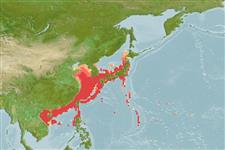Environment: milieu / climate zone / depth range / distribution range
Ecologie
marien; zoet water; brak water demersaal; katadroom (Ref. 51243); diepte 1 - 400 m (Ref. 6898). Subtropical; 4°C - 27°C (Ref. 12468); 46°N - 15°N, 105°E - 170°E
Asia: Japan to the East China Sea, Taiwan, Korea, China and northern Philippines. Spawning grounds of this species are presumed to be in the western Mariana Islands, at a salinity front near 15°N and 140°E (Ref. 54488). Most expensive food fish in Japan. Introduced elsewhere.
Grootte / Gewicht / Leeftijd
Maturity: Lm ? range ? - ? cm
Max length : 150 cm TL mannelijk / geslacht onbekend; (Ref. 9828); common length : 40.0 cm SL mannelijk / geslacht onbekend; (Ref. 35840); max. gepubliceerd gewicht: 1.9 kg (Ref. 82795)
Wervels: 114 - 118. Plain-colored.
Spawning occurs in the sea; small eels ascend the rivers in schools; develop and grow in freshwater. The species may crawl over land at night from one place to another (Ref. 5258, 11230). Adults feed on crustaceans, insects and fish (Ref. 5258). Maximum weight given (1889 g) has a maximum length of 100.8 cm TL in Ref. 82795. Utilized fresh, smoked, canned and frozen; eaten steamed, broiled and baked (Ref. 9988). Used in Chinese medicine (Ref. 12166).
Levenscyclus en paargedrag
Maturiteit | Voortplanting | Paaien | Eieren | Fecunditeit | Larven
Assuming reproductive mode to be the same as that of Anguilla anguilla.
Masuda, H., K. Amaoka, C. Araga, T. Uyeno and T. Yoshino, 1984. The fishes of the Japanese Archipelago. Vol. 1. Tokai University Press, Tokyo, Japan. 437 p. (text). (Ref. 559)
Status op de Rode Lijst van het IUCN (Ref. 130435)
Gevaar voor de mens
Harmless
Gebruik door de mens
Visserij: van groot commercieel belang; Aquacultuur: commercieel
Tools
Speciale rapporten
Download XML
Internetbronnen
Estimates based on models
Preferred temperature (Ref.
123201): 2.5 - 23.3, mean 17 °C (based on 432 cells).
Fylogenetische diversiteitsindex (Ref.
82804): PD
50 = 0.5000 [Uniqueness, from 0.5 = low to 2.0 = high].
Bayesian length-weight: a=0.00062 (0.00039 - 0.00099), b=3.18 (3.05 - 3.31), in cm total length, based on LWR estimates for this species & Genus-body shape (Ref.
93245).
Trofisch niveau (Ref.
69278): 3.6 ±0.51 se; based on food items.
Generation time: 15.7 ( na - na) years. Estimated as median ln(3)/K based on 1
growth studies.
Weerstandsvermogen (Ref.
120179): laag, minimale populatieverdubbelingstijd 4,5-14 jaar (K=0.07).
Fishing Vulnerability (Ref.
59153): High to very high vulnerability (71 of 100).
Nutrients (Ref.
124155): Calcium = 32.7 [19.9, 65.7] mg/100g; Iron = 0.741 [0.434, 1.157] mg/100g; Protein = 19.5 [17.7, 21.4] %; Omega3 = 0.35 [0.19, 0.67] g/100g; Selenium = 55.1 [28.6, 103.5] μg/100g; VitaminA = 8.74 [1.85, 42.36] μg/100g; Zinc = 0.685 [0.498, 0.991] mg/100g (wet weight); based on
nutrient studies.
